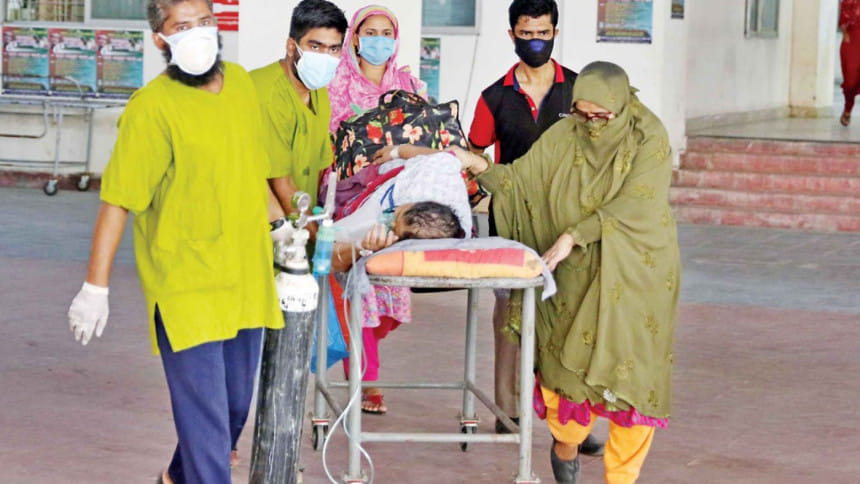Column by Mahfuz Anam: Lockdown chaos -- is it because we don’t value human lives?

Here we were, sailing quite smoothly after the first wave of the pandemic and congratulating ourselves for having "handled" it well. Even the WHO paid us compliments. But suddenly, within a few weeks, we seem to have gone right back where we started. The Covid-19 infection rate is galloping, crossing the 7,000-mark in recent days, while the death rate is also rising fast, with April 8 recording 74 deaths, the highest in a single day in Bangladesh—taking the total number of casualties to 9,521. Meanwhile, hospitals are overflowing with patients, struggling with the same old problems of inadequate emergency facilities, dearth of hospital beds, non-availability of ICUs and a general absence of oxygen supply throughout the country.
According to the Directorate General of Health Services (DGHS), there are a total of 2,752 Covid-19 treatment beds and 132 ICUs in the ten dedicated government hospitals in Dhaka. Additionally, there are 3,622 Covid-19 beds and 305 ICU beds in the private hospitals. The government has plans to increase the numbers of ICUs to 200 and general beds to 5,000. The DGHS also talked about a major initiative by Dhaka North City Corporation (DNCC) of making a temporary Covid hospital, the largest of such outfits, having 1,200 beds with a large number equipped with ICU options. Overall, the number of facilities is to double when all government and private hospitals finish their expansion.
There was never any doubt about a second wave of the pandemic. There were plenty of warnings from global and local experts about the impending resurgence in infections, and numerous examples of it happening in other countries. And yet, we kept on going in a business-as-usual manner.
This is precisely the point we want to drive home. Why are these facilities being readied or upgraded only now? Why did we waste the precious time that we had at hand? The signs of Covid-19 resurgence were palpable from the beginning of March, and by the 10th of the month, there were plenty of evidence written everywhere about the danger of a second wave. But we were not willing to see them. We busied ourselves with the anniversary celebrations. We could, and should, have done both: celebrate as well as prepare. This was not an either-or situation. A precious month of preparatory time was lost.
In addition to the lack of facilities, the situation is equally dire in the area of trained personnel—doctors, nurses, technicians and assistants. A report on the Mugda Hospital on April 7 revealed the desperate situation there created by a "manpower crunch", where the limited number of doctors, radiologists, nephrologists and nurses contributed to making the life of patients miserable.
Supply of oxygen is another factor to take note of. Mugda Hospital, where our reporter was present, was taking written "promise" from non-Covid-19 patients that they would be admitted only on the condition that they would not demand oxygen. In the emergency wards, oxygen was being provided to Covid-19 patients by turn—for 10 minutes—as more people had to be attended to than they had the capacity for.
So why are we at this stage of preparation for health services? There was no shortage of funds as the government gave it the priority it deserved. There was also time at hand after the first wave which we had managed reasonably well. The shortage was of foresight, adequate learning from experience, and consequent forward planning.
However, there is another type of shortage that I want to underscore. It is the shortage of accountability—accountability of how we plan and discharge our responsibilities; accountability of how our policies and actions, or lack thereof, impact on the lives of our citizens.
An appropriate example of the above is the fiasco over the latest "lockdown" imposed for a week from April 5 to April 12. The 11-point directive released on April 4 by the Cabinet Division—on the basis of which the lockdown is to be imposed—is neither well-thought-out nor scientific and, certainly, not implementable.
For example, directive 3 says (after banning all public transport by directive 1) that "all government/non-government/autonomous offices, courts and private offices can facilitate commute of their employees using their own transport on a limited scale. Industries and factories can do the same. Factories under BGMEA and BKMEA have to take measures regarding field hospitals/treatment for their workers."
The impractical nature of the above directive is almost self-evident. Can courts, non-government and private offices ensure commute of their staff? Do they have the means? Judges may have their own cars, but do the other staff? How can the factory owners arrange to bring thousands of their workers by their own transport? How many buses are required for that purpose? How can we have thousands of buses transporting workers when public transport is closed? Is that safe health-wise? Then there is the requirement for BGMEA and BKMEA to arrange for field hospitals for their workers. Do the directive writers have any idea how long it takes to set up field hospitals? Where will the equipment come from? Where are the doctors, nurses, technicians, medical equipment and the qualified staff needed to run them?
Directive 7 says: "Buying and selling of kitchen items and daily essentials can be done only in open spaces. In that case, the authorities concerned/local administrations will ensure the services." Do we know how many kitchen markets are there in the cities and how many "open spaces" will be required to relocate them to? Do they know if the requisite number of such spaces are available? What happens if there is no open space available, and in that case, does that particular area go without a kitchen market and, if so, where do the people of that locality do their groceries?
Directive 9 says: "Armed forces will take measures to establish a field hospital in a suitable location in Dhaka". We know our armed forces are efficient but expecting them to set up a field hospital, that too to treat Covid-19, on such short notice is unrealistic, to say the least.
The directives were made public on April 4 and the lockdown was to be effective from April 5. Where was the time for anybody, including the authorities, to prepare for such a massive undertaking involving all the big cities and the whole population of the country? When a Cabinet Division-level directive is full of such impractical, unimplementable and unthinking suggestions, where can we expect more rational work plans?
Then again, no effort was made to prepare the public for the impending lockdown. So, when the news came out, large numbers of city-dwellers rushed to buy essentials to store up, which destabilised the market and created a mini-panic. The more damaging development was the sudden exodus of the residents of Dhaka, especially from the lower-income groups, who thought that their sources of income would be shut down and they would be better off in their village homes during the period of the lockdown. This resulted in thousands of people quickly gathering at the bus and launch terminals leading to a total collapse of the protocols of social distancing. This one action can end up causing the disease to spread further. If we speculate on the impact of these "possibly infected" people spreading Covid-19 in the villages of their destination, then we have the making of a self-created problem resulting from armchair directive writers.
In fact, instead of helping to curb the spread of the virus, the ill-planned lockdown may, we think, cause to spread it, especially in the areas hitherto unaffected.
The unthinking policies, the unscientific ideas, the irrational proposals and the unimplementable directives all emanate from policy makers who have long since lost touch with the reality, and most importantly, have become so used to the culture of non-accountability for their actions that they just don't care what they say, what they do, and what they suggest. They know that howsoever wasteful and harmful their plans are and whatever may be the cost of their whims and ignorance—and howsoever many lives may be lost for their mistakes—they will never be held accountable.
This happens when the culture of impunity becomes all-pervasive, and people and their lives account for very little.
Mahfuz Anam is Editor and Publisher, The Daily Star.

 For all latest news, follow The Daily Star's Google News channel.
For all latest news, follow The Daily Star's Google News channel. 



Comments